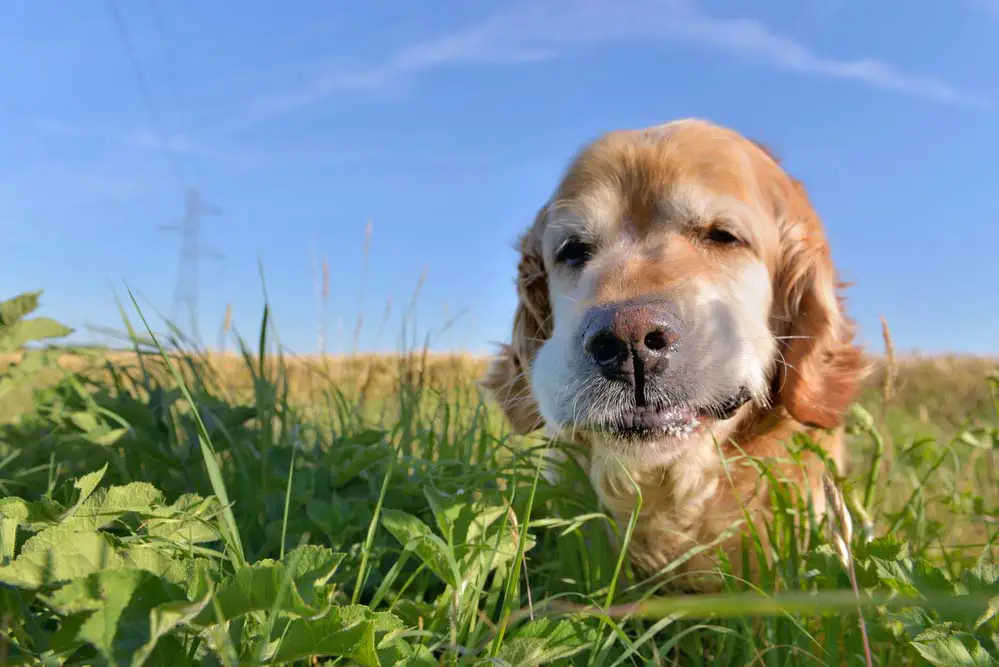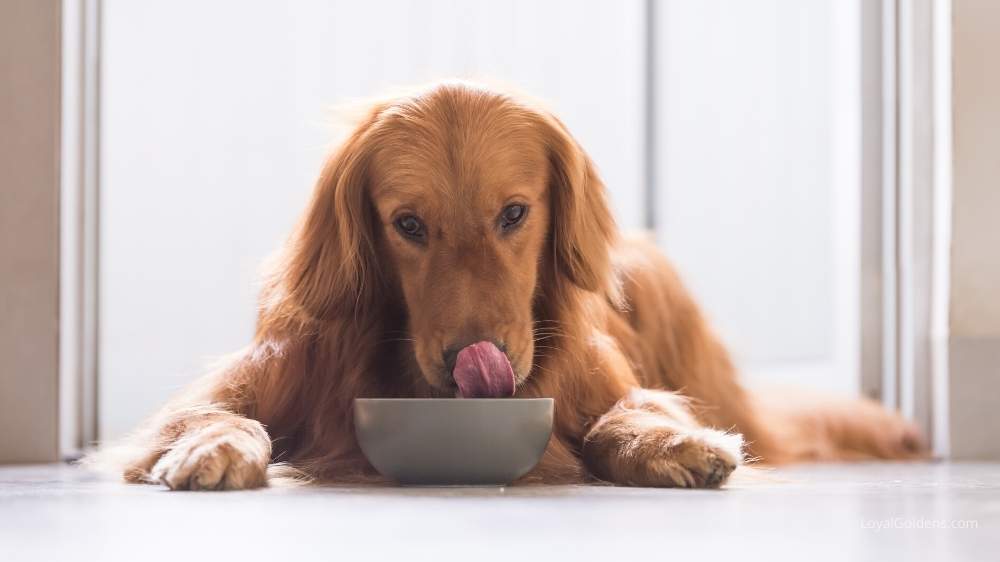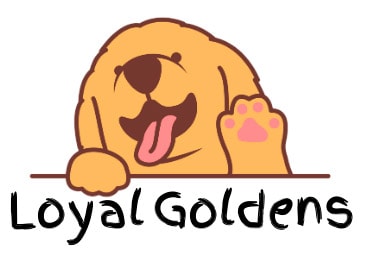In general, Golden Retrievers and other dogs eat grass to settle their stomach, treat intestinal worms, or fill an unmet nutritional need in their diet. Other reasons Golden Retrievers may eat grass include boredom and canine instinct.
While a common theory suggests that Golden Retrievers eat grass because they’re not feeling well and the grass will force them to vomit, veterinarians dispute this idea. Below, we’ll discuss some common reasons why your pup may be munching down on your lawn and weeds, why grass sometimes makes dogs sick, and how to stop your Golden Retriever from eating grass and vomiting.

(This article may contain affiliate links and loyalgoldens may earn a commission if a purchase is made.)
Unlock your goldens natural intelligence and see just how quickly problem behaviors disappear.This is the best at home dog training I've ever used!
What Causes Golden Retrievers to Eat Grass?
Veterinarians believe Golden Retrievers eat grass for a few key reasons, including helping with digestion, suffering from intestinal worms, pica, stress, and simply because they just like the taste and feel of it in their mouths.
Most experts agree, however, that Golden Retrievers don’t have the deductive reasoning to know that eating grass will soothe their stomachs. So, it is unlikely that your pup will eat grass if he or she is feeling sick. More likely is that eating the grass is what led your Golden to be sick and vomit in the first place.
Experts have proven that most dogs who eat grass aren’t generally feeling sick beforehand. More surprisingly, only a quarter or so of dogs will eat grass and then throw up. In other words, 75 percent of dogs that eat grass don’t get sick afterward. It’s only 25 percent of dogs who eat grass that just don’t have the stomach for it! Most dogs who eat grass will digest it, just like we do with leafy greens.
So, if it’s not to help them vomit, why do Golden Retrievers eat grass? Let’s break down some common reasons your pet might eat grass. Then, you can identify whether the issue is mild or is something to be concerned about.
Golden Retrievers Eat Grass To Aid Digestion
If your Golden Retriever finishes eating and heads straight for the grass, they may be attempting to digest their meal. Grass, like salad for humans, has fiber that helps push the dog food through your pup’s digestive system.
It’s the same reason your doctor tells you to add plenty of fiber to your diet. Fiber is good for you and it’s also good for your Golden. However, if your furry friend always heads for the lawn after a meal, you may want to check that the food you’re feeding has enough fiber already in it.
A fiber deficiency will make it hard for your pup to digest their food, go to the bathroom, and perform other necessary bodily functions.
Some Golden Retrievers may suffer from a fiber deficiency, and as we humans know, the easiest way to get more fiber is to eat more greens.
WebMD for Pets reports that a family with a miniature poodle was having trouble keeping their pup from eating grass and throwing up every single day. The dog did this for seven years, until a vet intervened and put the pup on a high-fiber diet. The dog never ate grass again.
Recommended: Can You Give Milk to a Golden Retriever? (Explained)
Intestinal Worms Can Cause Goldens To Eat Grass
Hookworms, tapeworms, and roundworms are common parasites to find in the intestines of Golden Retrievers. These internal parasites will make your pup’s tummy uncomfortable, and they may eat grass in an attempt to soothe themselves. Hookworms can kill young dogs, so if you suspect their grass-eating behavior is the result of a parasite, get them to the vet immediately.
In addition to eating grass, a Golden Retriever or other dog with an intestinal parasite may also have diarrhea (which could be bloody), a change in appetite, be throwing up often, suffer from weight loss, or have a rough and dry coat. In some dogs, you can spot tapeworms in their stool. Tapeworms look like small grains of rice.
Boredom, Stress, or Other Distress
Your Golden Retriever may just want your attention and will eat grass in an attempt to get it. Your dog knows that you react when he or she does something they’re not supposed to, and even though they know it’s bad, they’re still getting the attention that they weren’t getting before.
In addition, your pup may just be bored, stressed, or upset about something. If your dog eats grass while you’re not around, it may be because they’re sad that they’re on their own.
Most dogs will stop chomping down on weeds and grass once their owner moves outside to accompany them. Golden Retrievers, in general, are highly active dogs and if they’re not being exercised enough they may turn to destructive behaviors such as eating grass.
Pica May Cause a Golden Retriever To Eat Grass
Pica is a condition that occurs in a dog that isn’t getting its nutritional requirements from its dog food. These deficiencies can be in minerals, vitamins, and other nutrients, and could cause your Golden Retriever to look for the nutrition they need elsewhere, like in dirt, feces, wood, weeds, and grass.
Check with your vet if you’re concerned that your Golden’s food isn’t meeting his or her necessary requirements. They’ll be able to recommend a high-quality dog food if yours isn’t sufficient.
Related: Good Fruits and Vegetables For Golden Retrievers (Explained)

Golden Retrievers Are Instinctual Scavengers
If your Golden Retriever isn’t suffering from any nutritional imbalances and seems perfectly happy otherwise, but is still eating grass, you can probably blame instinct. Golden Retrievers have evolved into the domesticated pet we know today, but dogs used to survive on their own in the wild. They learned to fill their nutritional needs on their own by scavenging.
While they likely didn’t consume a lot of grass, they did hunt and eat other animals who had eaten various plants that could fulfill the dog’s nutritional requirements.
So, your Golden Retriever may be eating grass as part of a behavior that dates to when they were wild and had to hunt their own meals.
Related: Golden Ancestry: Are Retrievers Related to Wolves?
Some Golden Retrievers Eat Grass Because They Like It
Lastly, your dog may simply like eating grass. As we know, Golden Retrievers love to put things in their mouth, and grass is no exception. They may like the taste and texture, especially of fresh grass and weeds.
If you’re Golden Retriever occasionally chows down on a few blades of grass, he probably just likes it. In this case, there is no real problem and your Golden is just enjoying himself.
Why Does Grass Make Golden Retrievers Throw Up?
Not all Golden Retrievers will get sick from eating grass, but for the 25 percent or so who do, their vomiting is likely caused purely by stomach irritation. The fibrous grass can be difficult to break down for some pups.
If your Golden Retriever doesn’t feel better after throwing up the grass, something more serious could be to blame. If your dog ate grass while out on a walk or somewhere unfamiliar, the grass could have been treated with toxic fertilizers, pesticides, or other chemicals.
These toxins can be extremely dangerous for your dog. You should avoid letting them eat grass in a place where you don’t know how the grass or weeds have been treated. If your Golden Retriever inadvertently eats grass somewhere when you’re out and about, keep an eye on them. If they show any signs of distress take them to the vet right away.
Grass could also harbor parasites from other animal feces, which could make your Golden Retriever sick down the road.
Many houseplants will also make your Golden Retriever sick if eaten. Be sure you know which houseplants are dangerous for dogs.
Will My Golden Retriever Get Sick from Eating Grass?
There is a slight chance your Golden Retriever will get sick from eating grass, but most dogs can digest grass without issue.
If you see your Golden eating grass and you’re concerned they could get sick, watch them carefully for a while afterward. If your dog ingests grass that you’re unfamiliar with, it’s also a good idea to keep an eye on them in case that grass was treated with chemicals that could make your pup ill.
Discover how to train your Golden Retriever by playing games: 21 games to play with your Golden that will make them smarter and better behaved!
What Should I Do If My Golden Retriever Eats Grass?
Watch your Golden Retriever after they eat grass to make sure they don’t get sick. If they do, your dog will likely feel fine afterward. This means they’ve dealt with whatever was making their tummy upset.
However, if, after your dog ingests grass or weeds, you notice a change in behavior or excessive vomiting, take your pet to the vet right away.
What Can I Do to Stop My Golden Retriever from Eating Grass?
Depending on why you suspect your Golden Retriever is eating grass, there are several steps to take to curb the behavior.
- If you suspect your dog is suffering from a nutritional deficiency or pica, add supplements or change their food to something that is more balanced.
- If you think your Golden is bored or stressed, make sure they’re getting enough playtime and exercise. Or replace their grass chewing with an engaging chew toy instead.
- Leash your Golden Retriever during walks if they’re not responding to commands, and work on training them not to eat anything you don’t hand them. Use treats to reward your pup for listening and keep moving if they attempt to snack on grass.
Lastly, if your dog still wants to eat grass and you’ve tried all these solutions, it’s best to control their environment. Do a survey of the neighborhood where you walk daily to make sure the plants, weeds, and grasses aren’t dangerous.
You can also grow your own grass patches in your yard using pet-safe fertilizers. This way, if your dog does eat grass, you’ll know it isn’t harmful.
Conclusion
In conclusion, your Golden Retriever is likely eating grass for a reason, and it is your job to determine if that reason is harmless or harmful. Most dogs will not get sick from ingesting grass, but even if they do, they should be fine shortly afterward. If your pup continues to display worrying behavior, consult with your vet immediately.
